Public Health Report: Diabetes and Mental Health Challenges in the UK
VerifiedAdded on 2023/06/08
|9
|3100
|420
Report
AI Summary
This report examines the public health concern of diabetes in relation to mental health in Hounslow, London, UK. It discusses the impact of diabetes on mental health, including data from the UK and Hounslow, and investigates relevant health policies and their application. The report also explores the economic impact of diabetes and mental health issues in the UK and Hounslow, and analyzes interventions using behavioral models and theories. It critically evaluates the effectiveness of these interventions in addressing mental health challenges faced in Hounslow, UK. Furthermore, it assesses the roles of mental health nurses, educators, and health promoters within healthcare, emphasizing the application of health promotion models and theories. The conclusion emphasizes the interconnectedness of mental illness and diabetes, highlighting the importance of strategic self-management and behavioral alterations in improving patient health.
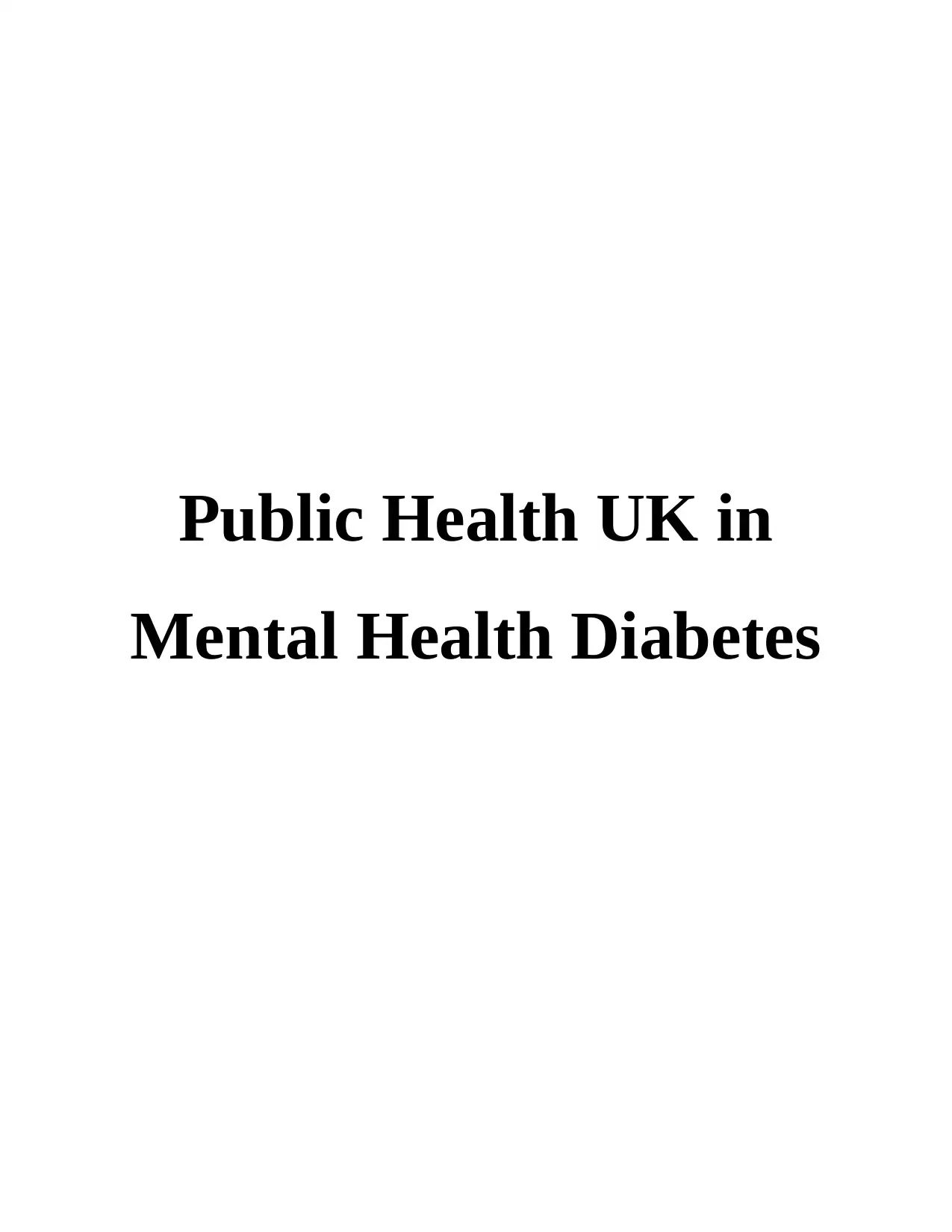
Public Health UK in
Mental Health Diabetes
Mental Health Diabetes
Paraphrase This Document
Need a fresh take? Get an instant paraphrase of this document with our AI Paraphraser
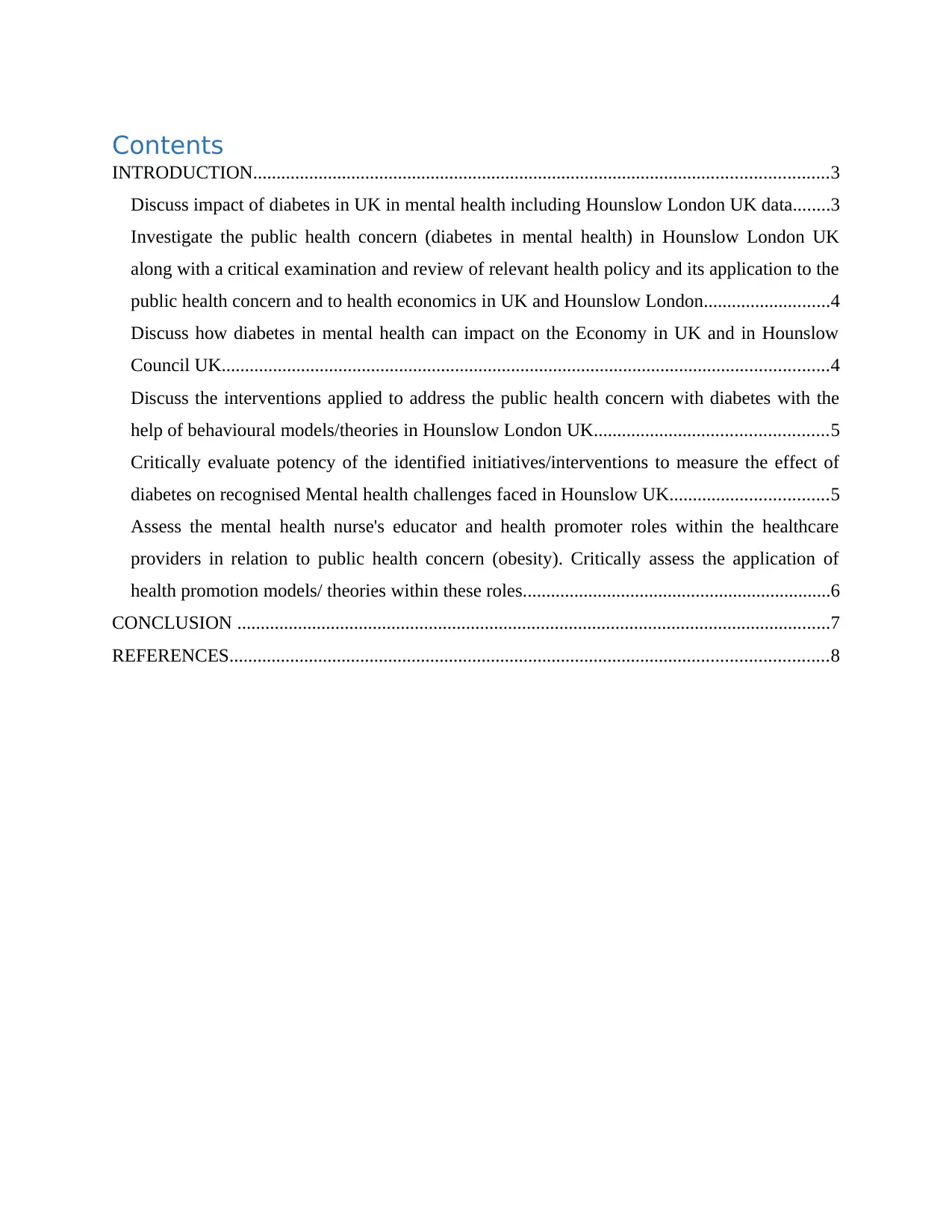
Contents
INTRODUCTION...........................................................................................................................3
Discuss impact of diabetes in UK in mental health including Hounslow London UK data........3
Investigate the public health concern (diabetes in mental health) in Hounslow London UK
along with a critical examination and review of relevant health policy and its application to the
public health concern and to health economics in UK and Hounslow London...........................4
Discuss how diabetes in mental health can impact on the Economy in UK and in Hounslow
Council UK..................................................................................................................................4
Discuss the interventions applied to address the public health concern with diabetes with the
help of behavioural models/theories in Hounslow London UK..................................................5
Critically evaluate potency of the identified initiatives/interventions to measure the effect of
diabetes on recognised Mental health challenges faced in Hounslow UK..................................5
Assess the mental health nurse's educator and health promoter roles within the healthcare
providers in relation to public health concern (obesity). Critically assess the application of
health promotion models/ theories within these roles..................................................................6
CONCLUSION ...............................................................................................................................7
REFERENCES................................................................................................................................8
INTRODUCTION...........................................................................................................................3
Discuss impact of diabetes in UK in mental health including Hounslow London UK data........3
Investigate the public health concern (diabetes in mental health) in Hounslow London UK
along with a critical examination and review of relevant health policy and its application to the
public health concern and to health economics in UK and Hounslow London...........................4
Discuss how diabetes in mental health can impact on the Economy in UK and in Hounslow
Council UK..................................................................................................................................4
Discuss the interventions applied to address the public health concern with diabetes with the
help of behavioural models/theories in Hounslow London UK..................................................5
Critically evaluate potency of the identified initiatives/interventions to measure the effect of
diabetes on recognised Mental health challenges faced in Hounslow UK..................................5
Assess the mental health nurse's educator and health promoter roles within the healthcare
providers in relation to public health concern (obesity). Critically assess the application of
health promotion models/ theories within these roles..................................................................6
CONCLUSION ...............................................................................................................................7
REFERENCES................................................................................................................................8
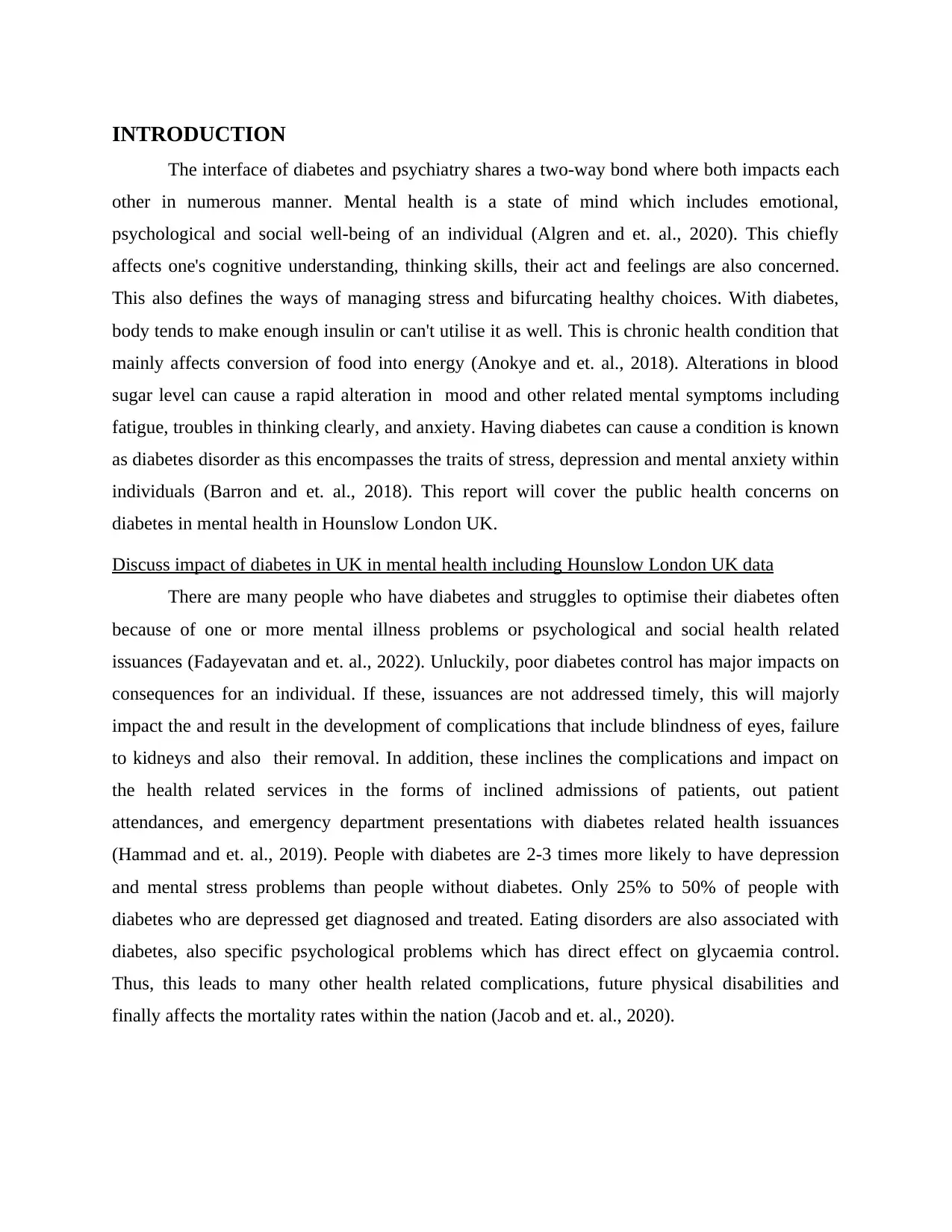
INTRODUCTION
The interface of diabetes and psychiatry shares a two-way bond where both impacts each
other in numerous manner. Mental health is a state of mind which includes emotional,
psychological and social well-being of an individual (Algren and et. al., 2020). This chiefly
affects one's cognitive understanding, thinking skills, their act and feelings are also concerned.
This also defines the ways of managing stress and bifurcating healthy choices. With diabetes,
body tends to make enough insulin or can't utilise it as well. This is chronic health condition that
mainly affects conversion of food into energy (Anokye and et. al., 2018). Alterations in blood
sugar level can cause a rapid alteration in mood and other related mental symptoms including
fatigue, troubles in thinking clearly, and anxiety. Having diabetes can cause a condition is known
as diabetes disorder as this encompasses the traits of stress, depression and mental anxiety within
individuals (Barron and et. al., 2018). This report will cover the public health concerns on
diabetes in mental health in Hounslow London UK.
Discuss impact of diabetes in UK in mental health including Hounslow London UK data
There are many people who have diabetes and struggles to optimise their diabetes often
because of one or more mental illness problems or psychological and social health related
issuances (Fadayevatan and et. al., 2022). Unluckily, poor diabetes control has major impacts on
consequences for an individual. If these, issuances are not addressed timely, this will majorly
impact the and result in the development of complications that include blindness of eyes, failure
to kidneys and also their removal. In addition, these inclines the complications and impact on
the health related services in the forms of inclined admissions of patients, out patient
attendances, and emergency department presentations with diabetes related health issuances
(Hammad and et. al., 2019). People with diabetes are 2-3 times more likely to have depression
and mental stress problems than people without diabetes. Only 25% to 50% of people with
diabetes who are depressed get diagnosed and treated. Eating disorders are also associated with
diabetes, also specific psychological problems which has direct effect on glycaemia control.
Thus, this leads to many other health related complications, future physical disabilities and
finally affects the mortality rates within the nation (Jacob and et. al., 2020).
The interface of diabetes and psychiatry shares a two-way bond where both impacts each
other in numerous manner. Mental health is a state of mind which includes emotional,
psychological and social well-being of an individual (Algren and et. al., 2020). This chiefly
affects one's cognitive understanding, thinking skills, their act and feelings are also concerned.
This also defines the ways of managing stress and bifurcating healthy choices. With diabetes,
body tends to make enough insulin or can't utilise it as well. This is chronic health condition that
mainly affects conversion of food into energy (Anokye and et. al., 2018). Alterations in blood
sugar level can cause a rapid alteration in mood and other related mental symptoms including
fatigue, troubles in thinking clearly, and anxiety. Having diabetes can cause a condition is known
as diabetes disorder as this encompasses the traits of stress, depression and mental anxiety within
individuals (Barron and et. al., 2018). This report will cover the public health concerns on
diabetes in mental health in Hounslow London UK.
Discuss impact of diabetes in UK in mental health including Hounslow London UK data
There are many people who have diabetes and struggles to optimise their diabetes often
because of one or more mental illness problems or psychological and social health related
issuances (Fadayevatan and et. al., 2022). Unluckily, poor diabetes control has major impacts on
consequences for an individual. If these, issuances are not addressed timely, this will majorly
impact the and result in the development of complications that include blindness of eyes, failure
to kidneys and also their removal. In addition, these inclines the complications and impact on
the health related services in the forms of inclined admissions of patients, out patient
attendances, and emergency department presentations with diabetes related health issuances
(Hammad and et. al., 2019). People with diabetes are 2-3 times more likely to have depression
and mental stress problems than people without diabetes. Only 25% to 50% of people with
diabetes who are depressed get diagnosed and treated. Eating disorders are also associated with
diabetes, also specific psychological problems which has direct effect on glycaemia control.
Thus, this leads to many other health related complications, future physical disabilities and
finally affects the mortality rates within the nation (Jacob and et. al., 2020).
⊘ This is a preview!⊘
Do you want full access?
Subscribe today to unlock all pages.

Trusted by 1+ million students worldwide
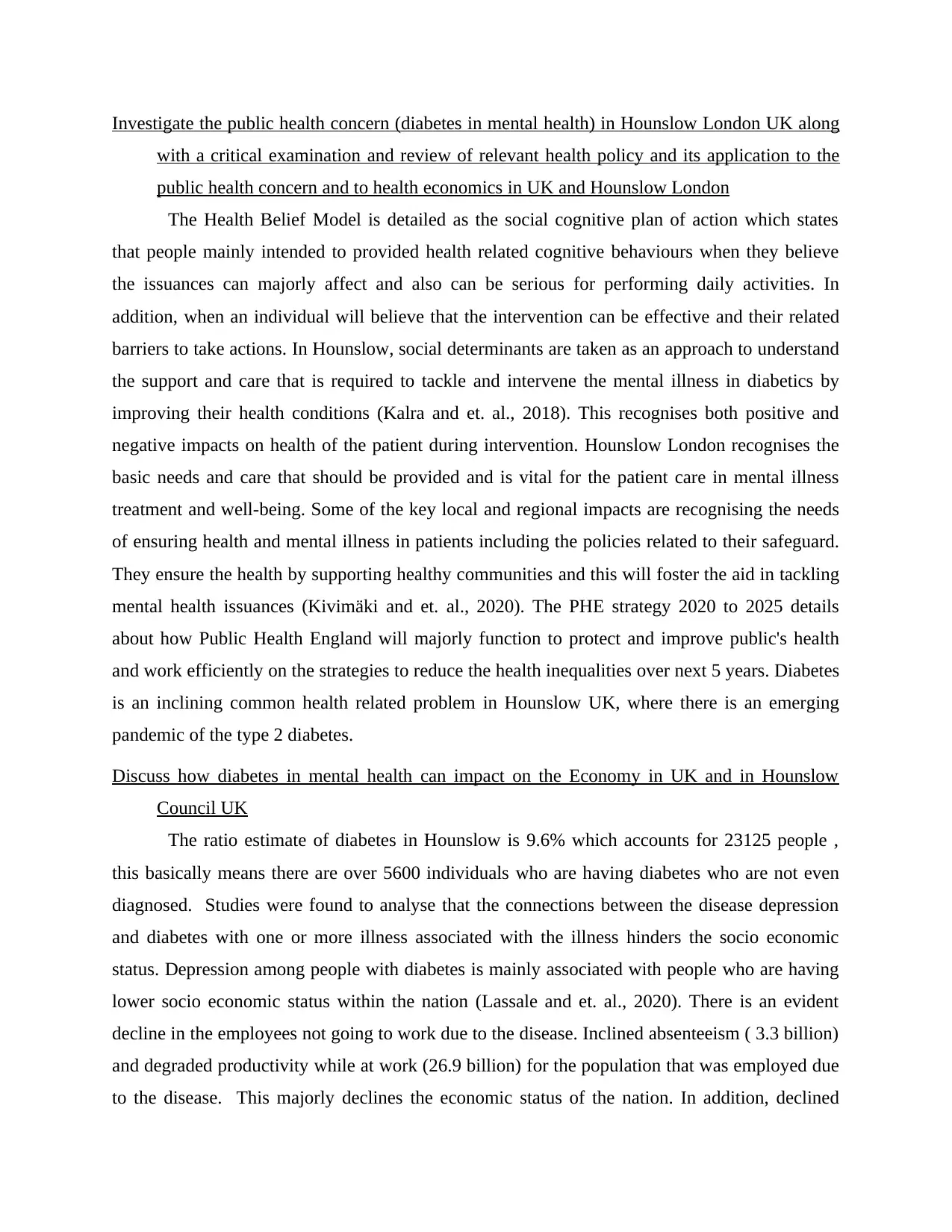
Investigate the public health concern (diabetes in mental health) in Hounslow London UK along
with a critical examination and review of relevant health policy and its application to the
public health concern and to health economics in UK and Hounslow London
The Health Belief Model is detailed as the social cognitive plan of action which states
that people mainly intended to provided health related cognitive behaviours when they believe
the issuances can majorly affect and also can be serious for performing daily activities. In
addition, when an individual will believe that the intervention can be effective and their related
barriers to take actions. In Hounslow, social determinants are taken as an approach to understand
the support and care that is required to tackle and intervene the mental illness in diabetics by
improving their health conditions (Kalra and et. al., 2018). This recognises both positive and
negative impacts on health of the patient during intervention. Hounslow London recognises the
basic needs and care that should be provided and is vital for the patient care in mental illness
treatment and well-being. Some of the key local and regional impacts are recognising the needs
of ensuring health and mental illness in patients including the policies related to their safeguard.
They ensure the health by supporting healthy communities and this will foster the aid in tackling
mental health issuances (Kivimäki and et. al., 2020). The PHE strategy 2020 to 2025 details
about how Public Health England will majorly function to protect and improve public's health
and work efficiently on the strategies to reduce the health inequalities over next 5 years. Diabetes
is an inclining common health related problem in Hounslow UK, where there is an emerging
pandemic of the type 2 diabetes.
Discuss how diabetes in mental health can impact on the Economy in UK and in Hounslow
Council UK
The ratio estimate of diabetes in Hounslow is 9.6% which accounts for 23125 people ,
this basically means there are over 5600 individuals who are having diabetes who are not even
diagnosed. Studies were found to analyse that the connections between the disease depression
and diabetes with one or more illness associated with the illness hinders the socio economic
status. Depression among people with diabetes is mainly associated with people who are having
lower socio economic status within the nation (Lassale and et. al., 2020). There is an evident
decline in the employees not going to work due to the disease. Inclined absenteeism ( 3.3 billion)
and degraded productivity while at work (26.9 billion) for the population that was employed due
to the disease. This majorly declines the economic status of the nation. In addition, declined
with a critical examination and review of relevant health policy and its application to the
public health concern and to health economics in UK and Hounslow London
The Health Belief Model is detailed as the social cognitive plan of action which states
that people mainly intended to provided health related cognitive behaviours when they believe
the issuances can majorly affect and also can be serious for performing daily activities. In
addition, when an individual will believe that the intervention can be effective and their related
barriers to take actions. In Hounslow, social determinants are taken as an approach to understand
the support and care that is required to tackle and intervene the mental illness in diabetics by
improving their health conditions (Kalra and et. al., 2018). This recognises both positive and
negative impacts on health of the patient during intervention. Hounslow London recognises the
basic needs and care that should be provided and is vital for the patient care in mental illness
treatment and well-being. Some of the key local and regional impacts are recognising the needs
of ensuring health and mental illness in patients including the policies related to their safeguard.
They ensure the health by supporting healthy communities and this will foster the aid in tackling
mental health issuances (Kivimäki and et. al., 2020). The PHE strategy 2020 to 2025 details
about how Public Health England will majorly function to protect and improve public's health
and work efficiently on the strategies to reduce the health inequalities over next 5 years. Diabetes
is an inclining common health related problem in Hounslow UK, where there is an emerging
pandemic of the type 2 diabetes.
Discuss how diabetes in mental health can impact on the Economy in UK and in Hounslow
Council UK
The ratio estimate of diabetes in Hounslow is 9.6% which accounts for 23125 people ,
this basically means there are over 5600 individuals who are having diabetes who are not even
diagnosed. Studies were found to analyse that the connections between the disease depression
and diabetes with one or more illness associated with the illness hinders the socio economic
status. Depression among people with diabetes is mainly associated with people who are having
lower socio economic status within the nation (Lassale and et. al., 2020). There is an evident
decline in the employees not going to work due to the disease. Inclined absenteeism ( 3.3 billion)
and degraded productivity while at work (26.9 billion) for the population that was employed due
to the disease. This majorly declines the economic status of the nation. In addition, declined
Paraphrase This Document
Need a fresh take? Get an instant paraphrase of this document with our AI Paraphraser
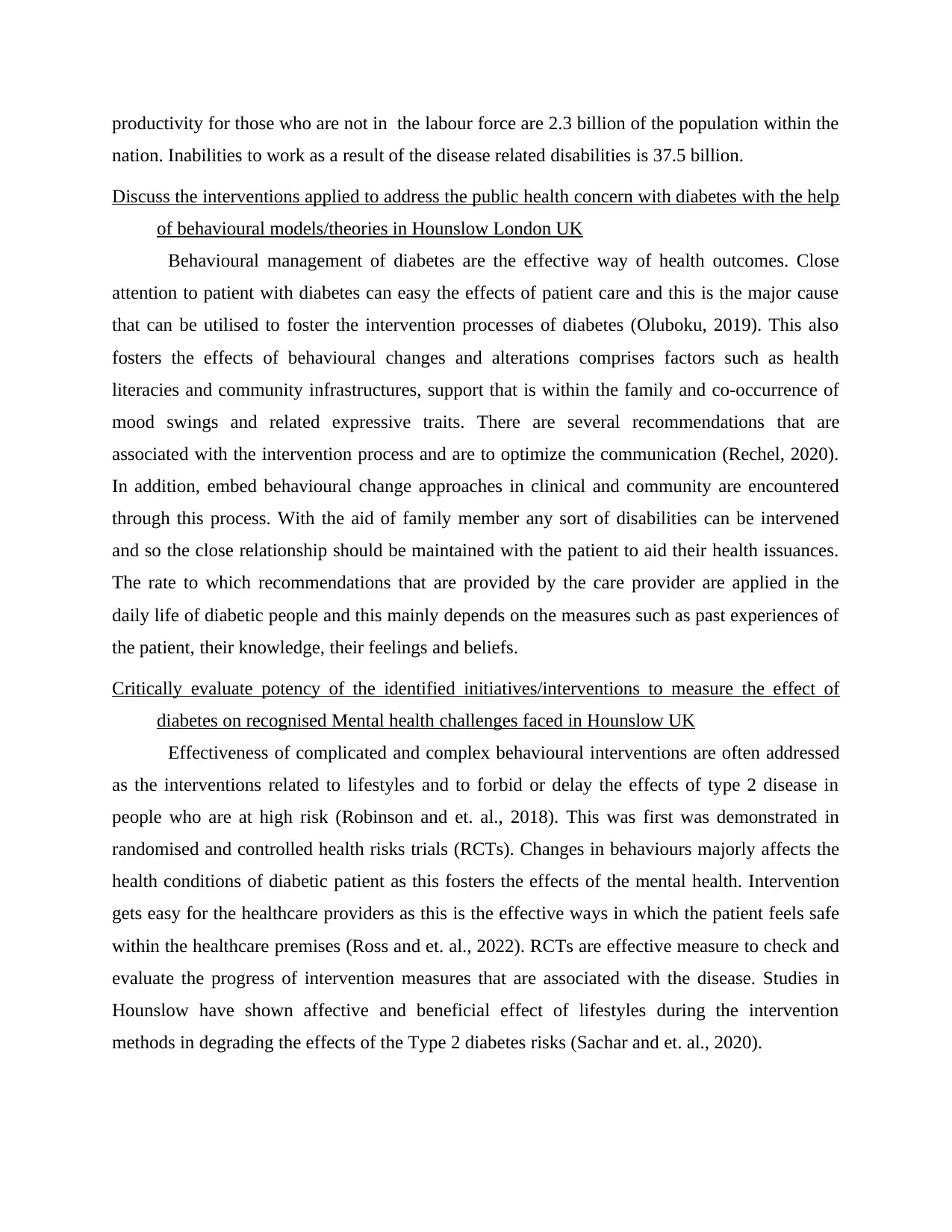
productivity for those who are not in the labour force are 2.3 billion of the population within the
nation. Inabilities to work as a result of the disease related disabilities is 37.5 billion.
Discuss the interventions applied to address the public health concern with diabetes with the help
of behavioural models/theories in Hounslow London UK
Behavioural management of diabetes are the effective way of health outcomes. Close
attention to patient with diabetes can easy the effects of patient care and this is the major cause
that can be utilised to foster the intervention processes of diabetes (Oluboku, 2019). This also
fosters the effects of behavioural changes and alterations comprises factors such as health
literacies and community infrastructures, support that is within the family and co-occurrence of
mood swings and related expressive traits. There are several recommendations that are
associated with the intervention process and are to optimize the communication (Rechel, 2020).
In addition, embed behavioural change approaches in clinical and community are encountered
through this process. With the aid of family member any sort of disabilities can be intervened
and so the close relationship should be maintained with the patient to aid their health issuances.
The rate to which recommendations that are provided by the care provider are applied in the
daily life of diabetic people and this mainly depends on the measures such as past experiences of
the patient, their knowledge, their feelings and beliefs.
Critically evaluate potency of the identified initiatives/interventions to measure the effect of
diabetes on recognised Mental health challenges faced in Hounslow UK
Effectiveness of complicated and complex behavioural interventions are often addressed
as the interventions related to lifestyles and to forbid or delay the effects of type 2 disease in
people who are at high risk (Robinson and et. al., 2018). This was first was demonstrated in
randomised and controlled health risks trials (RCTs). Changes in behaviours majorly affects the
health conditions of diabetic patient as this fosters the effects of the mental health. Intervention
gets easy for the healthcare providers as this is the effective ways in which the patient feels safe
within the healthcare premises (Ross and et. al., 2022). RCTs are effective measure to check and
evaluate the progress of intervention measures that are associated with the disease. Studies in
Hounslow have shown affective and beneficial effect of lifestyles during the intervention
methods in degrading the effects of the Type 2 diabetes risks (Sachar and et. al., 2020).
nation. Inabilities to work as a result of the disease related disabilities is 37.5 billion.
Discuss the interventions applied to address the public health concern with diabetes with the help
of behavioural models/theories in Hounslow London UK
Behavioural management of diabetes are the effective way of health outcomes. Close
attention to patient with diabetes can easy the effects of patient care and this is the major cause
that can be utilised to foster the intervention processes of diabetes (Oluboku, 2019). This also
fosters the effects of behavioural changes and alterations comprises factors such as health
literacies and community infrastructures, support that is within the family and co-occurrence of
mood swings and related expressive traits. There are several recommendations that are
associated with the intervention process and are to optimize the communication (Rechel, 2020).
In addition, embed behavioural change approaches in clinical and community are encountered
through this process. With the aid of family member any sort of disabilities can be intervened
and so the close relationship should be maintained with the patient to aid their health issuances.
The rate to which recommendations that are provided by the care provider are applied in the
daily life of diabetic people and this mainly depends on the measures such as past experiences of
the patient, their knowledge, their feelings and beliefs.
Critically evaluate potency of the identified initiatives/interventions to measure the effect of
diabetes on recognised Mental health challenges faced in Hounslow UK
Effectiveness of complicated and complex behavioural interventions are often addressed
as the interventions related to lifestyles and to forbid or delay the effects of type 2 disease in
people who are at high risk (Robinson and et. al., 2018). This was first was demonstrated in
randomised and controlled health risks trials (RCTs). Changes in behaviours majorly affects the
health conditions of diabetic patient as this fosters the effects of the mental health. Intervention
gets easy for the healthcare providers as this is the effective ways in which the patient feels safe
within the healthcare premises (Ross and et. al., 2022). RCTs are effective measure to check and
evaluate the progress of intervention measures that are associated with the disease. Studies in
Hounslow have shown affective and beneficial effect of lifestyles during the intervention
methods in degrading the effects of the Type 2 diabetes risks (Sachar and et. al., 2020).
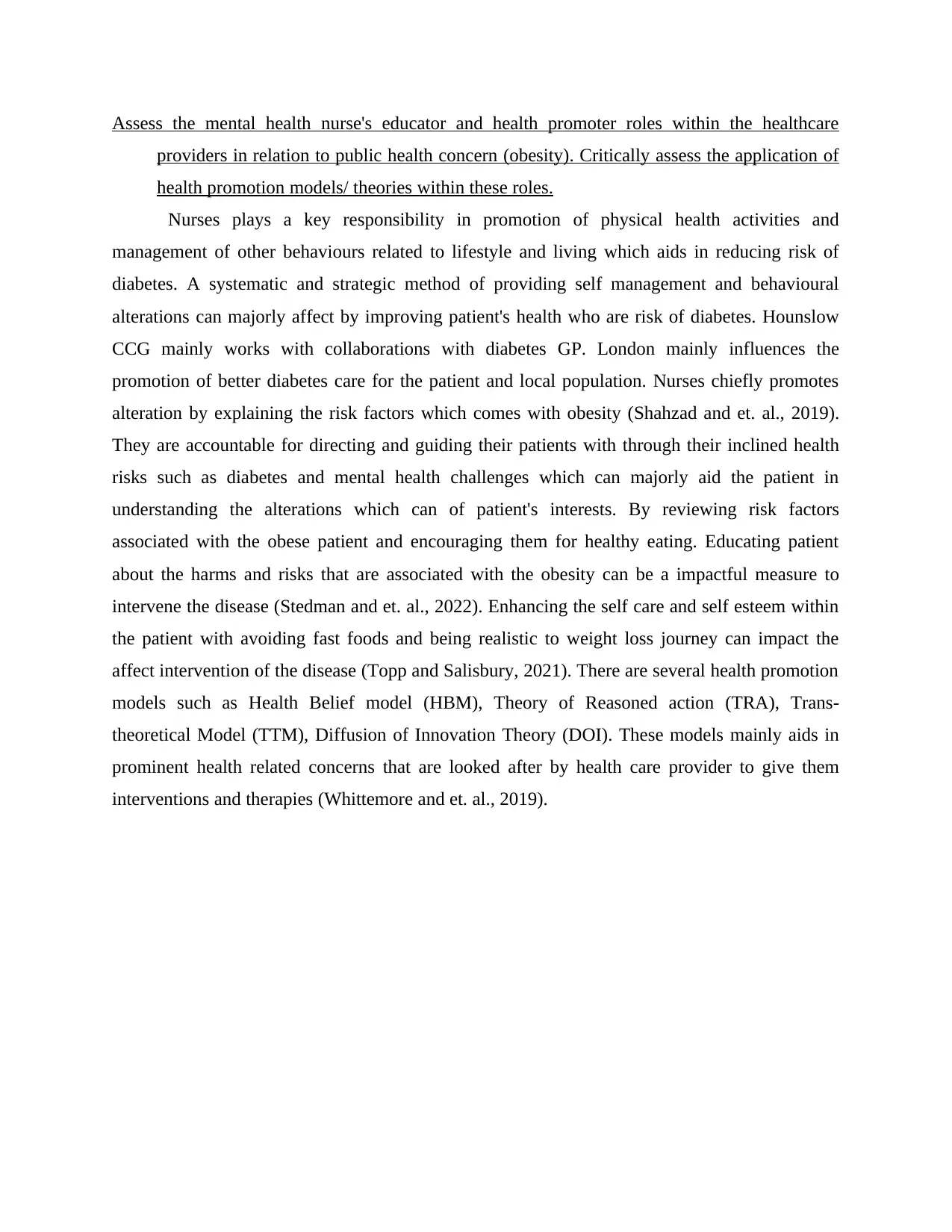
Assess the mental health nurse's educator and health promoter roles within the healthcare
providers in relation to public health concern (obesity). Critically assess the application of
health promotion models/ theories within these roles.
Nurses plays a key responsibility in promotion of physical health activities and
management of other behaviours related to lifestyle and living which aids in reducing risk of
diabetes. A systematic and strategic method of providing self management and behavioural
alterations can majorly affect by improving patient's health who are risk of diabetes. Hounslow
CCG mainly works with collaborations with diabetes GP. London mainly influences the
promotion of better diabetes care for the patient and local population. Nurses chiefly promotes
alteration by explaining the risk factors which comes with obesity (Shahzad and et. al., 2019).
They are accountable for directing and guiding their patients with through their inclined health
risks such as diabetes and mental health challenges which can majorly aid the patient in
understanding the alterations which can of patient's interests. By reviewing risk factors
associated with the obese patient and encouraging them for healthy eating. Educating patient
about the harms and risks that are associated with the obesity can be a impactful measure to
intervene the disease (Stedman and et. al., 2022). Enhancing the self care and self esteem within
the patient with avoiding fast foods and being realistic to weight loss journey can impact the
affect intervention of the disease (Topp and Salisbury, 2021). There are several health promotion
models such as Health Belief model (HBM), Theory of Reasoned action (TRA), Trans-
theoretical Model (TTM), Diffusion of Innovation Theory (DOI). These models mainly aids in
prominent health related concerns that are looked after by health care provider to give them
interventions and therapies (Whittemore and et. al., 2019).
providers in relation to public health concern (obesity). Critically assess the application of
health promotion models/ theories within these roles.
Nurses plays a key responsibility in promotion of physical health activities and
management of other behaviours related to lifestyle and living which aids in reducing risk of
diabetes. A systematic and strategic method of providing self management and behavioural
alterations can majorly affect by improving patient's health who are risk of diabetes. Hounslow
CCG mainly works with collaborations with diabetes GP. London mainly influences the
promotion of better diabetes care for the patient and local population. Nurses chiefly promotes
alteration by explaining the risk factors which comes with obesity (Shahzad and et. al., 2019).
They are accountable for directing and guiding their patients with through their inclined health
risks such as diabetes and mental health challenges which can majorly aid the patient in
understanding the alterations which can of patient's interests. By reviewing risk factors
associated with the obese patient and encouraging them for healthy eating. Educating patient
about the harms and risks that are associated with the obesity can be a impactful measure to
intervene the disease (Stedman and et. al., 2022). Enhancing the self care and self esteem within
the patient with avoiding fast foods and being realistic to weight loss journey can impact the
affect intervention of the disease (Topp and Salisbury, 2021). There are several health promotion
models such as Health Belief model (HBM), Theory of Reasoned action (TRA), Trans-
theoretical Model (TTM), Diffusion of Innovation Theory (DOI). These models mainly aids in
prominent health related concerns that are looked after by health care provider to give them
interventions and therapies (Whittemore and et. al., 2019).
⊘ This is a preview!⊘
Do you want full access?
Subscribe today to unlock all pages.

Trusted by 1+ million students worldwide
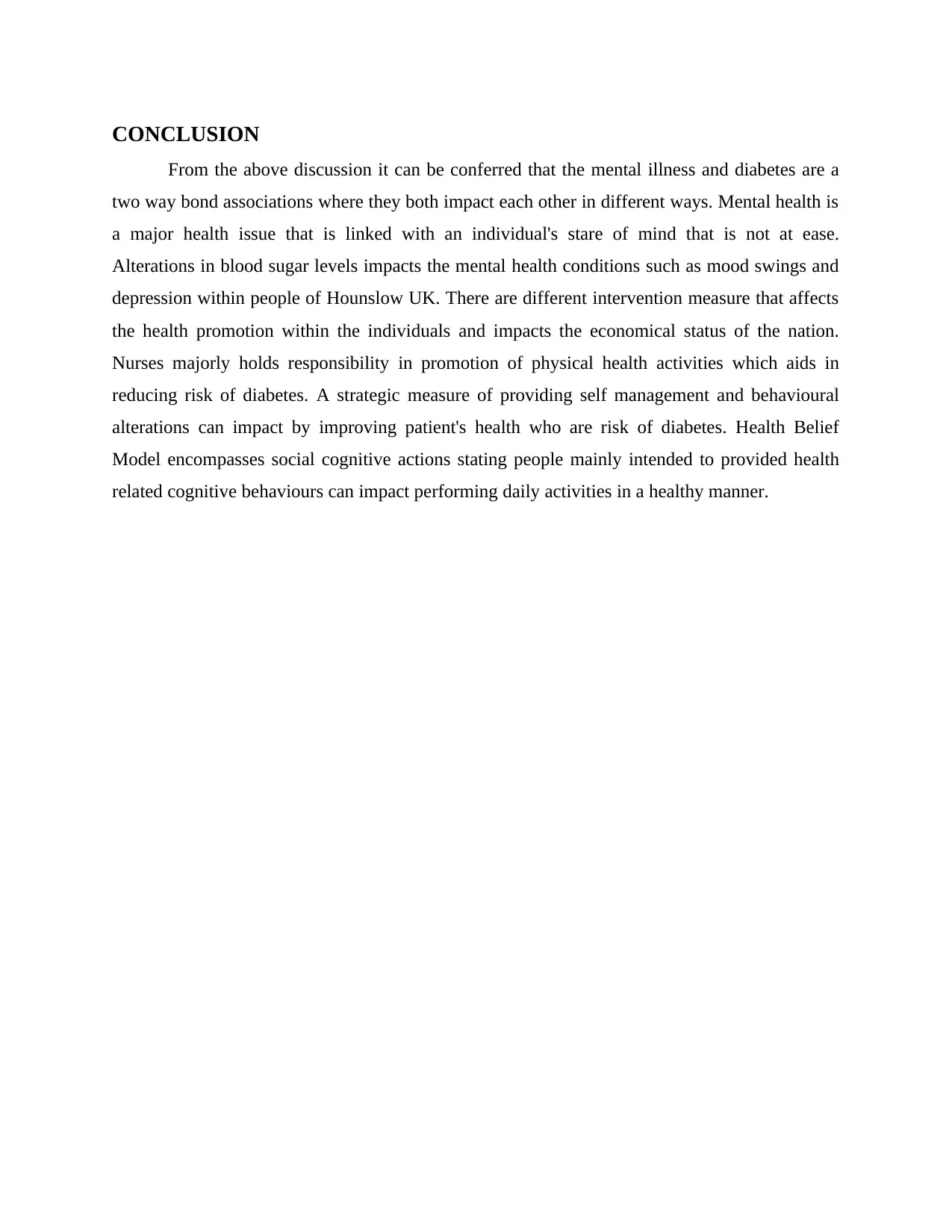
CONCLUSION
From the above discussion it can be conferred that the mental illness and diabetes are a
two way bond associations where they both impact each other in different ways. Mental health is
a major health issue that is linked with an individual's stare of mind that is not at ease.
Alterations in blood sugar levels impacts the mental health conditions such as mood swings and
depression within people of Hounslow UK. There are different intervention measure that affects
the health promotion within the individuals and impacts the economical status of the nation.
Nurses majorly holds responsibility in promotion of physical health activities which aids in
reducing risk of diabetes. A strategic measure of providing self management and behavioural
alterations can impact by improving patient's health who are risk of diabetes. Health Belief
Model encompasses social cognitive actions stating people mainly intended to provided health
related cognitive behaviours can impact performing daily activities in a healthy manner.
From the above discussion it can be conferred that the mental illness and diabetes are a
two way bond associations where they both impact each other in different ways. Mental health is
a major health issue that is linked with an individual's stare of mind that is not at ease.
Alterations in blood sugar levels impacts the mental health conditions such as mood swings and
depression within people of Hounslow UK. There are different intervention measure that affects
the health promotion within the individuals and impacts the economical status of the nation.
Nurses majorly holds responsibility in promotion of physical health activities which aids in
reducing risk of diabetes. A strategic measure of providing self management and behavioural
alterations can impact by improving patient's health who are risk of diabetes. Health Belief
Model encompasses social cognitive actions stating people mainly intended to provided health
related cognitive behaviours can impact performing daily activities in a healthy manner.
Paraphrase This Document
Need a fresh take? Get an instant paraphrase of this document with our AI Paraphraser
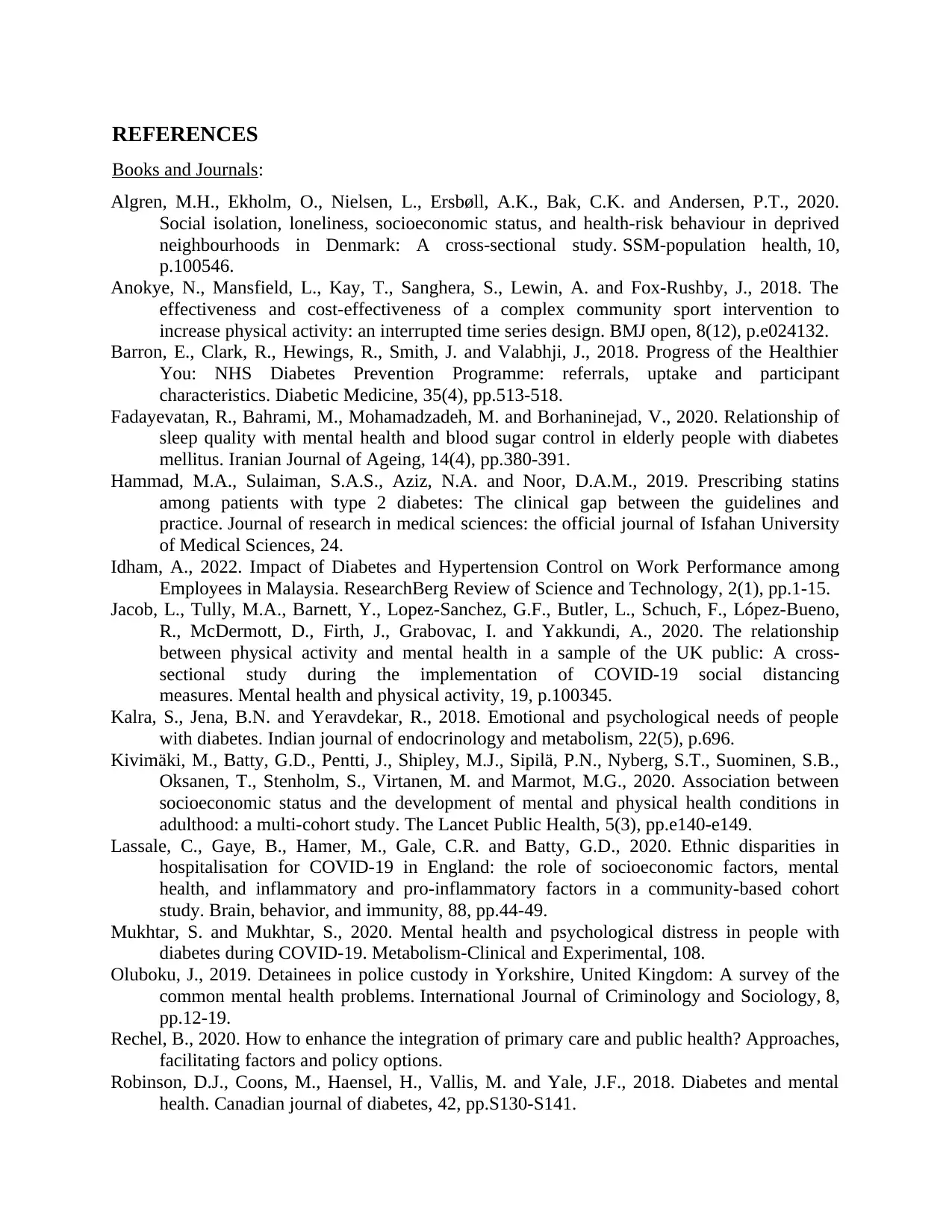
REFERENCES
Books and Journals:
Algren, M.H., Ekholm, O., Nielsen, L., Ersbøll, A.K., Bak, C.K. and Andersen, P.T., 2020.
Social isolation, loneliness, socioeconomic status, and health-risk behaviour in deprived
neighbourhoods in Denmark: A cross-sectional study. SSM-population health, 10,
p.100546.
Anokye, N., Mansfield, L., Kay, T., Sanghera, S., Lewin, A. and Fox-Rushby, J., 2018. The
effectiveness and cost-effectiveness of a complex community sport intervention to
increase physical activity: an interrupted time series design. BMJ open, 8(12), p.e024132.
Barron, E., Clark, R., Hewings, R., Smith, J. and Valabhji, J., 2018. Progress of the Healthier
You: NHS Diabetes Prevention Programme: referrals, uptake and participant
characteristics. Diabetic Medicine, 35(4), pp.513-518.
Fadayevatan, R., Bahrami, M., Mohamadzadeh, M. and Borhaninejad, V., 2020. Relationship of
sleep quality with mental health and blood sugar control in elderly people with diabetes
mellitus. Iranian Journal of Ageing, 14(4), pp.380-391.
Hammad, M.A., Sulaiman, S.A.S., Aziz, N.A. and Noor, D.A.M., 2019. Prescribing statins
among patients with type 2 diabetes: The clinical gap between the guidelines and
practice. Journal of research in medical sciences: the official journal of Isfahan University
of Medical Sciences, 24.
Idham, A., 2022. Impact of Diabetes and Hypertension Control on Work Performance among
Employees in Malaysia. ResearchBerg Review of Science and Technology, 2(1), pp.1-15.
Jacob, L., Tully, M.A., Barnett, Y., Lopez-Sanchez, G.F., Butler, L., Schuch, F., López-Bueno,
R., McDermott, D., Firth, J., Grabovac, I. and Yakkundi, A., 2020. The relationship
between physical activity and mental health in a sample of the UK public: A cross-
sectional study during the implementation of COVID-19 social distancing
measures. Mental health and physical activity, 19, p.100345.
Kalra, S., Jena, B.N. and Yeravdekar, R., 2018. Emotional and psychological needs of people
with diabetes. Indian journal of endocrinology and metabolism, 22(5), p.696.
Kivimäki, M., Batty, G.D., Pentti, J., Shipley, M.J., Sipilä, P.N., Nyberg, S.T., Suominen, S.B.,
Oksanen, T., Stenholm, S., Virtanen, M. and Marmot, M.G., 2020. Association between
socioeconomic status and the development of mental and physical health conditions in
adulthood: a multi-cohort study. The Lancet Public Health, 5(3), pp.e140-e149.
Lassale, C., Gaye, B., Hamer, M., Gale, C.R. and Batty, G.D., 2020. Ethnic disparities in
hospitalisation for COVID-19 in England: the role of socioeconomic factors, mental
health, and inflammatory and pro-inflammatory factors in a community-based cohort
study. Brain, behavior, and immunity, 88, pp.44-49.
Mukhtar, S. and Mukhtar, S., 2020. Mental health and psychological distress in people with
diabetes during COVID-19. Metabolism-Clinical and Experimental, 108.
Oluboku, J., 2019. Detainees in police custody in Yorkshire, United Kingdom: A survey of the
common mental health problems. International Journal of Criminology and Sociology, 8,
pp.12-19.
Rechel, B., 2020. How to enhance the integration of primary care and public health? Approaches,
facilitating factors and policy options.
Robinson, D.J., Coons, M., Haensel, H., Vallis, M. and Yale, J.F., 2018. Diabetes and mental
health. Canadian journal of diabetes, 42, pp.S130-S141.
Books and Journals:
Algren, M.H., Ekholm, O., Nielsen, L., Ersbøll, A.K., Bak, C.K. and Andersen, P.T., 2020.
Social isolation, loneliness, socioeconomic status, and health-risk behaviour in deprived
neighbourhoods in Denmark: A cross-sectional study. SSM-population health, 10,
p.100546.
Anokye, N., Mansfield, L., Kay, T., Sanghera, S., Lewin, A. and Fox-Rushby, J., 2018. The
effectiveness and cost-effectiveness of a complex community sport intervention to
increase physical activity: an interrupted time series design. BMJ open, 8(12), p.e024132.
Barron, E., Clark, R., Hewings, R., Smith, J. and Valabhji, J., 2018. Progress of the Healthier
You: NHS Diabetes Prevention Programme: referrals, uptake and participant
characteristics. Diabetic Medicine, 35(4), pp.513-518.
Fadayevatan, R., Bahrami, M., Mohamadzadeh, M. and Borhaninejad, V., 2020. Relationship of
sleep quality with mental health and blood sugar control in elderly people with diabetes
mellitus. Iranian Journal of Ageing, 14(4), pp.380-391.
Hammad, M.A., Sulaiman, S.A.S., Aziz, N.A. and Noor, D.A.M., 2019. Prescribing statins
among patients with type 2 diabetes: The clinical gap between the guidelines and
practice. Journal of research in medical sciences: the official journal of Isfahan University
of Medical Sciences, 24.
Idham, A., 2022. Impact of Diabetes and Hypertension Control on Work Performance among
Employees in Malaysia. ResearchBerg Review of Science and Technology, 2(1), pp.1-15.
Jacob, L., Tully, M.A., Barnett, Y., Lopez-Sanchez, G.F., Butler, L., Schuch, F., López-Bueno,
R., McDermott, D., Firth, J., Grabovac, I. and Yakkundi, A., 2020. The relationship
between physical activity and mental health in a sample of the UK public: A cross-
sectional study during the implementation of COVID-19 social distancing
measures. Mental health and physical activity, 19, p.100345.
Kalra, S., Jena, B.N. and Yeravdekar, R., 2018. Emotional and psychological needs of people
with diabetes. Indian journal of endocrinology and metabolism, 22(5), p.696.
Kivimäki, M., Batty, G.D., Pentti, J., Shipley, M.J., Sipilä, P.N., Nyberg, S.T., Suominen, S.B.,
Oksanen, T., Stenholm, S., Virtanen, M. and Marmot, M.G., 2020. Association between
socioeconomic status and the development of mental and physical health conditions in
adulthood: a multi-cohort study. The Lancet Public Health, 5(3), pp.e140-e149.
Lassale, C., Gaye, B., Hamer, M., Gale, C.R. and Batty, G.D., 2020. Ethnic disparities in
hospitalisation for COVID-19 in England: the role of socioeconomic factors, mental
health, and inflammatory and pro-inflammatory factors in a community-based cohort
study. Brain, behavior, and immunity, 88, pp.44-49.
Mukhtar, S. and Mukhtar, S., 2020. Mental health and psychological distress in people with
diabetes during COVID-19. Metabolism-Clinical and Experimental, 108.
Oluboku, J., 2019. Detainees in police custody in Yorkshire, United Kingdom: A survey of the
common mental health problems. International Journal of Criminology and Sociology, 8,
pp.12-19.
Rechel, B., 2020. How to enhance the integration of primary care and public health? Approaches,
facilitating factors and policy options.
Robinson, D.J., Coons, M., Haensel, H., Vallis, M. and Yale, J.F., 2018. Diabetes and mental
health. Canadian journal of diabetes, 42, pp.S130-S141.
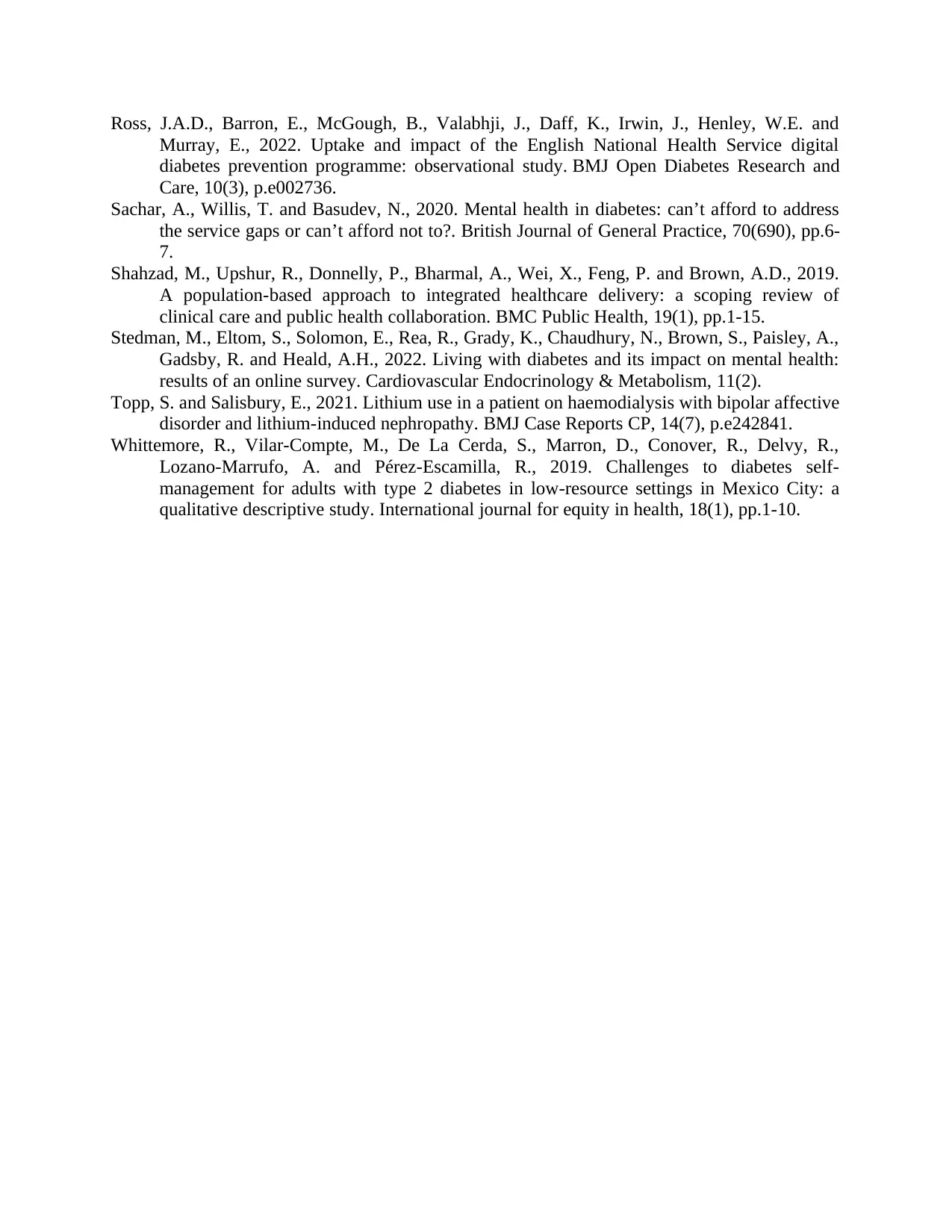
Ross, J.A.D., Barron, E., McGough, B., Valabhji, J., Daff, K., Irwin, J., Henley, W.E. and
Murray, E., 2022. Uptake and impact of the English National Health Service digital
diabetes prevention programme: observational study. BMJ Open Diabetes Research and
Care, 10(3), p.e002736.
Sachar, A., Willis, T. and Basudev, N., 2020. Mental health in diabetes: can’t afford to address
the service gaps or can’t afford not to?. British Journal of General Practice, 70(690), pp.6-
7.
Shahzad, M., Upshur, R., Donnelly, P., Bharmal, A., Wei, X., Feng, P. and Brown, A.D., 2019.
A population-based approach to integrated healthcare delivery: a scoping review of
clinical care and public health collaboration. BMC Public Health, 19(1), pp.1-15.
Stedman, M., Eltom, S., Solomon, E., Rea, R., Grady, K., Chaudhury, N., Brown, S., Paisley, A.,
Gadsby, R. and Heald, A.H., 2022. Living with diabetes and its impact on mental health:
results of an online survey. Cardiovascular Endocrinology & Metabolism, 11(2).
Topp, S. and Salisbury, E., 2021. Lithium use in a patient on haemodialysis with bipolar affective
disorder and lithium-induced nephropathy. BMJ Case Reports CP, 14(7), p.e242841.
Whittemore, R., Vilar-Compte, M., De La Cerda, S., Marron, D., Conover, R., Delvy, R.,
Lozano-Marrufo, A. and Pérez-Escamilla, R., 2019. Challenges to diabetes self-
management for adults with type 2 diabetes in low-resource settings in Mexico City: a
qualitative descriptive study. International journal for equity in health, 18(1), pp.1-10.
Murray, E., 2022. Uptake and impact of the English National Health Service digital
diabetes prevention programme: observational study. BMJ Open Diabetes Research and
Care, 10(3), p.e002736.
Sachar, A., Willis, T. and Basudev, N., 2020. Mental health in diabetes: can’t afford to address
the service gaps or can’t afford not to?. British Journal of General Practice, 70(690), pp.6-
7.
Shahzad, M., Upshur, R., Donnelly, P., Bharmal, A., Wei, X., Feng, P. and Brown, A.D., 2019.
A population-based approach to integrated healthcare delivery: a scoping review of
clinical care and public health collaboration. BMC Public Health, 19(1), pp.1-15.
Stedman, M., Eltom, S., Solomon, E., Rea, R., Grady, K., Chaudhury, N., Brown, S., Paisley, A.,
Gadsby, R. and Heald, A.H., 2022. Living with diabetes and its impact on mental health:
results of an online survey. Cardiovascular Endocrinology & Metabolism, 11(2).
Topp, S. and Salisbury, E., 2021. Lithium use in a patient on haemodialysis with bipolar affective
disorder and lithium-induced nephropathy. BMJ Case Reports CP, 14(7), p.e242841.
Whittemore, R., Vilar-Compte, M., De La Cerda, S., Marron, D., Conover, R., Delvy, R.,
Lozano-Marrufo, A. and Pérez-Escamilla, R., 2019. Challenges to diabetes self-
management for adults with type 2 diabetes in low-resource settings in Mexico City: a
qualitative descriptive study. International journal for equity in health, 18(1), pp.1-10.
⊘ This is a preview!⊘
Do you want full access?
Subscribe today to unlock all pages.

Trusted by 1+ million students worldwide
1 out of 9
Related Documents
Your All-in-One AI-Powered Toolkit for Academic Success.
+13062052269
info@desklib.com
Available 24*7 on WhatsApp / Email
![[object Object]](/_next/static/media/star-bottom.7253800d.svg)
Unlock your academic potential
Copyright © 2020–2025 A2Z Services. All Rights Reserved. Developed and managed by ZUCOL.





